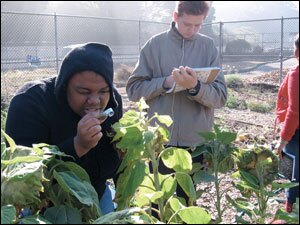Dozens of nonprofits, growers’ associations, botanical gardens, and other groups offer assistance to teachers interested in starting school gardens. Here are just a few:
The Chicago Botanic Garden gives hands-on help to schools in the Chicago area. Educators elsewhere can use the School Garden Wizard, an online resource with tips for everything from convincing principals to using gardens as teaching tools.
www.schoolgardenwizard.org

The National Gardening Association has a Web page with information for young gardeners and teachers, including projects and success stories. Teachers can subscribe to an e-newsletter, apply for grants, and sign up for conferences.
www.kidsgardening.org
The Edible Schoolyard, a garden and kitchen classroom in Berkeley, California, offers a more philosophical perspective. (“The garden and kitchen provide a context for understanding seasonality and life cycles.”) The 10-year-old program started with the help of acclaimed chef Alice Waters.
www.edibleschoolyard.org
Return to the main story,
The Western Growers Association provides step-by-step advice for getting started, such as forming a garden committee, testing soil, and ensuring the garden will get five to eight hours of sun each day.
www.wga.com




